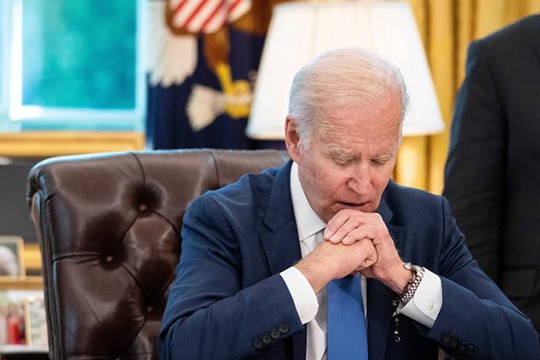The White House in a difficult bind: move to end the war on terms less favorable to Ukraine than earlier promised, and the administration will face an onslaught of criticism not unlike that which followed the Afghanistan withdrawal, including from his own base, notes American ‘Responsible Statecraft’.
Before the summer, US had the broad outline of what the endgame of the war in Ukraine would look like: Kyiv would train and build up its forces, launch a summer offensive, reclaim as much territory as it could, and finally enter peace talks with the strongest negotiating hand possible and bring the war to a close.
Now, two months into that offensive and with summer’s end nearing, that scenario looks increasingly unlikely. The Ukrainian offensive has by all accounts stalled, as often exhausted, inexperienced, and hastily trained troops are running headfirst into dug-in and heavily mined Russian defenses, at horrific human cost.
Ukrainian forces are expending materiel at an unsustainable rate, using up 90,000 shells a month when the Pentagon is only producing a third of that, while 20 percent of the NATO weaponry it deployed was damaged or destroyed in the first two weeks.
The question is, where is all of this going and how is it going to end?
Earlier reporting from the Washington Post indicated that U.S. officials had told Ukrainian President Volodymyr Zelensky he likely had until the end of summer to make as much progress as possible before U.S. support for military aid dried up and he’d be forced to negotiate. But at the same time, the White House continues to insist it will support the Ukrainian war effort “as long as it takes.”
Perhaps the administration simply wants to publicly exude resolve. But there is also the chance that this is more than just posturing.
Partly because of the hyperbolic rhetoric the administration and NATO allies have deployed to sell the urgency of continued military aid, the public has been led to believe the outcome of the war matters not just to Kyiv and its recapture of lost territory, but carries existential stakes for U.S. security, the entire global order, even democracy itself.
Extricating the United States from the war, in other words, will require the administration to abruptly pivot away from claiming the very future of global peace and democracy hinges on Russian defeat — or, as President Biden said while visiting Poland this February, that “what literally is at stake is not just Ukraine, it’s freedom.”
Yet such maximalist talk is now conventional thinking in the U.S. political landscape. Republican presidential contender Chris Christie recently met with strong agreement from the liberal hosts of MSNBC’s Morning Joe when he charged that, should the United States “cut and run” from Ukraine, it would trigger a Chinese invasion of Taiwan.
It’s not a leap to hear in these words — and those of NATO officials — the echoes of the Cold War-era “domino theory,” the discredited doctrine that led the United States to get pulled into the disastrous Vietnam war.
Even if officials don’t truly believe U.S. and European security is on the line, it’s clear something else might be: The prestige and credibility of the United States and NATO.
Worse, any Russian successes — whether real or perceived — could be viewed as politically unacceptable or even humiliating for NATO’s leadership, along with exposing divisions that have until now been largely suppressed. Fear over loss of prestige and credibility was one of the factors that kept U.S. involvement in Vietnam going and going, as it did for Iraq, Afghanistan and other wars.
Meanwhile, reporting suggests that, rightly or wrongly, the president views the outcome on the battlefield as important to his chances of reelection next year. Yet recent polling has a majority of Americans, including 71 percent of Republicans and 55 percent of independents, opposing further military aid to Ukraine, while it’s Democrats that are most supportive.
read more in our Telegram-channel https://t.me/The_International_Affairs

 11:21 21.08.2023 •
11:21 21.08.2023 •























